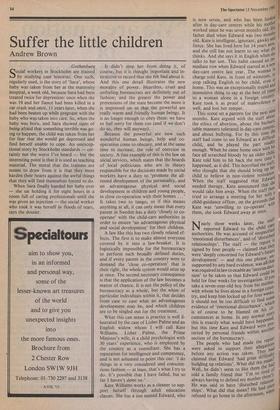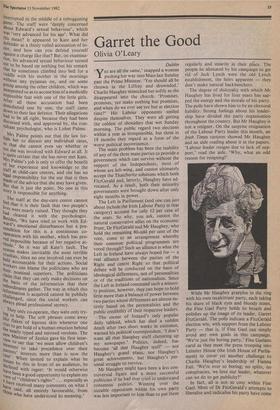Suffer the little children
Andrew Brown
Gothenburg
Social workers in Stockholm are trained by studying case histories. One such, regularly used, is the story of 'Sara', whose baby was taken from her at the maternity hospital, a week old, because Sara had been treated twice for depression: once when she was 19 and her fiancé had been killed in a car crash and once, 11 years later, when she had been beaten up while pregnant with the baby who was taken into care. So, when the baby was born, and Sara showed signs of being afraid that something terrible was go- ing to happen, the child was taken from her for fear that she would get depressed and find herself unable to cope. An unexcep- tional story by Stockholm standards — cer- tainly not the worst I've heard — but the interesting point is that it is used as teaching material. The moral that the trainees are meant to draw from it is that they must harden their hearts against the awful things that they will find themselves forced to do.
When Sara finally handed her baby over — she sat holding it for eight hours in a room full of caring professionals until she was given an injection — the social worker who took it was herself in floods of tears, says the dossier.
It didn't stop her from doing it, of course, but it is thought important and in- structive to record that she felt bad.about it. And this one detail illustrates the new morality of power. Heartless, cruel and unfeeling bureaucrats are definitely out of fashion; and the greater the power and pretensions of the state become the more it is impressed on us that the powerful are really warm and friendly human beings. It is no longer enough to obey them: we have to feel sorry for them too (and if we don't do so, they will anyway).
Because the powerful are now such wonderful human beings, help and co- operation come to obscure, and at the same time to increase, the role of coercion in society. A fine example of this is the law on social services, which states that the boards of local politicians who are in theory responsible for the decisions made by social workers have a duty to 'promote the all- round development of the personality, and an advantageous physical and social development in children and young people, in close co-operation with their homes ...' It takes two to tango, so if this means anything at all, it can only mean that every parent in Sweden has a duty 'closely to co- operate' with the child-care authorities in order to ensure 'an advantageous physical and social development' for their children.
A law like this has two closely related ef- fects. The first is to make almost everyone covered by it into a law-breaker. It is logistically impossible for the bureaucracy to perform such broadly defined duties, and if every parent in the country were to demand the 'close co-operation' that is their right, the whole system would seize up at once. The second necessary consequence is that the application of the law becomes a matter of chance. It is not the policy of the bureaucracy as a whole, but the whim of particular individuals within it, that decides from case to case what an advantageous development may be, and which children are to be singled out for the treatment.
What this can mean is practice is well il- lustrated by the case of Lisbet Palme and an English widow whom I will call Kate Williams. Lisbet Palme, the Prime Minister's wife, is a child psychologist with 30 years' experience, who is employed by the country as a consultant. She has a reputation for intelligence and competence, and is not ashamed to point this out: 'I do things in a very considered and conscien- tious fashion — at least, that's what I try to do. It's possible that I have failed, but so far I haven't done so.'
Kate Williams works as a cleaner to sup- port herself through adult education classes. She has a son named Edward, who
The Spectator 13 November 1982 is now seven, and who has been looked after in day-care centres while his mother worked since he was seven months old. His father died when Edward was two months old. Kate is intelligent, ignorant, gawky and fierce. She has lived here for 14 years now, and she still has not learnt to say what she thinks. And she says it in English when she talks to her son. This habit caused an um mediate row when Edward started at a no' day-care centre last year. The woman in charge told Kate, in front of witnesses, to stop talking English to her child, even 31A home. This was an exceptionally stupid and insensitive thing to say at the best of times to a woman alone in a foreign counrrY. Kate took it as proof of malevolence as well, and lost her temper. This scene set a pattern for the next nine months. Kate argued with the staff about the ethics of abortion, about the barbaric table manners tolerated in day-care centres' and about bullying. For by this time the staff had come to see Edward as a difficu.,,t child, and he played the part read"? enough. When he came home once with his face all scratched bloody by an older child, Kate told him to hit back the next time it happened, as it did. This horrified the staff, who thought that she should bring UP her child to believe in non-violent resistance,' When the staff suggested that Edwaru needed therapy, Kate announced that she would take him away. When the staff then tried to arrange a meeting for her with a child-guidance officer, on the grounds thah Kate was 'unwilling to co-operate' wit them, she took Edward away at once. Nearly three weeks later, the mt.( reported Edward to the child eeifearie fed authorities. He was accused of unspA 'emotional disturbances', and of 'clisturbe." relationships'. The staff — the report 15 signed by four people — claimed that thq were 'deeply concerned for Edward's futurc development' — and this one phrase, uhai supported by any hard evidence, was all th was required in law to enable an `interimdec.1_ sion' to be taken so that Edward could held for four weeks for investigation. If31°,, take a seven-year-old boy from his mothel with whom he lives alone in a foreign coun- try, and keep him locked up for four vieek‘,, it should not be too difficult to find s°r11.cli'' evidence of 'emotional disturbance', will._ is of course to be blamed on his cur cumstances at home. In any normal steel this is exactly what would have happen but this time Kate and Edward were p.er re, st eeccttei odn by personal a friends within another The people who had made the reports were asked to support their allegatioand before any action was taken. The ha claimed ity claimed that Edward 'had great difoc9 building up relations'. What did this nlea"d Well he didn't seem to like them (he ha told a family friend that 'I'm so tired always having to defend my mother ther.e He was said to have 'disturbed relauo cne ships'. What did that mean? He had °fen refused to go home in the afternoon, " interrupted in the middle of a tobogganing game. The staff were 'deeply concerned
about Edward's sexual behaviour', which
aS 'very advanced for his age'. What did this mean? It appeared to Kate and her defender as a thinly veiled accusation of in- cest, and how can you defend yourself against a charge like that? But, on examina- Item, his advanced sexual behaviour turned out to be based on nothing but his remark that he sometimes climbed into bed for a coddle with his mother in the mornings
Without any pyjamas on, and on some gossip among the other children, which was interpreted so as to accuse him of a medically
impossible feat with one of the little girls. After all these accusation had been demolished one by one, the staff came down to their last defence. Their allegations had d to be all right, because they had been discussed with, and approved by, the con- sultant psychologist, who is Lisbet Palme.
Mrs Palme points out that the law for- bids her to discuss any individual cases, so that she cannot even say whether or not she was involved with Edward at all. It Is quite certain that she has never met Kate. Mrs Palme's job is only to offer the benefit of her experience and knowledge to the
staff at child-care centres, and she has no legal responsibility for the use that is then
made of the advice that she may have given. But that is just the point. No one in this story is responsible for anything. _ The staff at the day-care centre cannot
!lives that it is their fault that two people's Ives were nearly ruined. They thought they had cleared it with the psychologist. Besides, 'We have tried to work with Ed- ward's emotional disturbances but a pre- condition for this is a continuous co- oPeration with his mother, which has pro- 4�d irnpossible because of her negative at- ude, So it was all Kate's fault. The system makes inevitable the most terrible
cruelties, since no one involved can ever be eld accountable for their actions. Social workers can blame the politicians who are their nominal superiors. The politicians the that they can only make decisions on
e basis of the information that their subordinates gather. The way in which this i euf°rnlation is acquired cannot be publicly h , allenged, since the social workers can always plead professional secrecy. i They only co-operate, they were only try- lhg to help. The soft phrases come away tries flakes of leprous skin whenever one
the to get hold of a human emotion behind new neatly typed and xeroxed versions. The yew Minister of Justice gave his first inter- : lew to say that 'we must allow children's pinterests to take precedence over their _arents' interests more than is now the _case
When invited to explain what he dineant by this in front of an audience, he heehned with regret: 'It would otherwise v",ave been a good opportunity to explain my hthew of "children's rights" ... especially as "ave received many comments on what I thave said, all entirely favourable, from °se who have understood its meaning.'















































 Previous page
Previous page